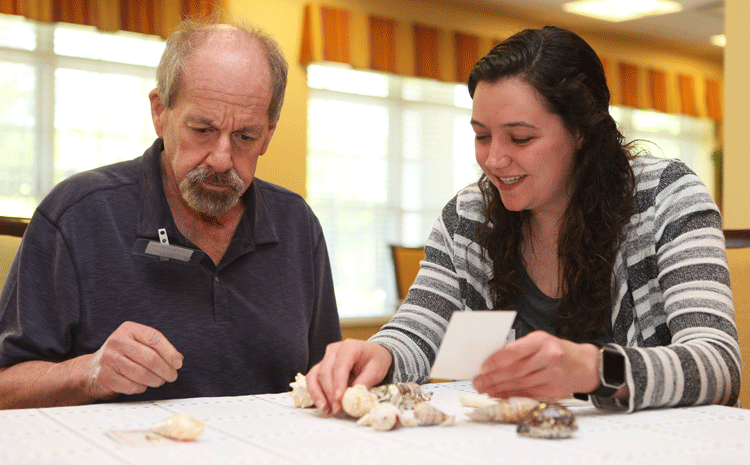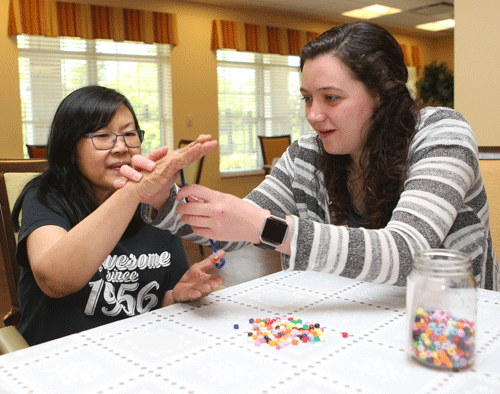
Students, Clients Benefit in Dementia Care Program
Sep 27, 2019
Natalie Sinak stands in front of the closet that Xavier student employees use when they come to work at St. Charles Community, a day care center for elderly people who have dementia and cognitive issues. She picks out two books, two puzzles, a box of buttons and checkers and carries them over to a secluded table in the back room where she waits for the program director to escort one of the elderly participants to her.
Natalie gets settled at the table as her supervisor brings over first-time visitor Allen Wonderly, who confidently walks over and introduces himself. Dressed in a red plaid button-up shirt and wearing dark-framed glasses and a smile from ear to ear, he believes he, too, is a volunteer. He and Natalie strike up a conversation while he completes a Montessori puzzle by putting the wooden shapes into the correct spaces.
For both Natalie and Wonderly, the day’s learning has just begun. “We give the participants an activity while they talk to us,” she says. “You can see how happy they are to be interacting with us.”
Natalie is a senior Occupational Therapy major at Xavier University. Last year, she was one of five Xavier students working at St. Charles, where administrators have adopted Xavier’s Montessori approach toward dementia care. The program helps those affected with dementia to still perform daily activities such as reading and putting together puzzles and tasks like setting the table for meals, encouraging them to be more independent.
The Xavier Montessori Dementia program began in 2016 when Kathleen Farfsing, a 1983 and 2000 graduate of the Montessori undergraduate and graduate programs, became program coordinator and began offering Montessori training to teachers, social workers, nurses and caregivers in memory care units at retirement centers and assisted living facilities.
The program promotes using Montessori methods with people who are experiencing neurocognitive decline, including dementia and Alzheimer’s. The numbers are staggering, Farfsing says. “There are more people over the age of 65 than under the age of 5. It is something that’s happening globally, and our workforce needs to address it.”
Farfing’s goal to include students in the Montessori Dementia program was made possible in 2017 by a grant from Xavier’s Women of Excellence that allowed her to start the partnership with St. Charles Community, run by the Sisters of Notre Dame in Covington, Ky. The two-year grant allowed her to train students to work in settings managed by her program, beginning at St. Charles.
In the adult program at St. Charles, family members drop off their loved ones in the morning and pick them up in the afternoon. The program helps the clients with their social, physical and emotional needs.
Xavier student employees learn the basics of dementia—what it is, what it looks like, how to approach and engage people with dementia—and are trained in using the Montessori philosophy and techniques to change the environment and introduce activities that engage the participants in meaningful work. The students provide activities for the participants of St. Charles and then give feedback about what works and what doesn’t.
“From there we learn what the clients can and can’t do. We implement the skills they have and use it to help them with the things they can’t do, to learn those new things,” Farfsing says. “We collect all this information and find an activity that is meaningful for them.”
At Natalie’s table, Wonderly tires of the games, so he heads over to join others in the program. Natalie begins to fill out a questionnaire where she reports his behavior during their interaction, his demonstrated interest, his ability to sustain attention and his overall attitude. The results from each questionnaire are stored in a folder for Farfsing, who brings them back for analysis.
“I think the fact that we (student workers) are even here makes an impact,” Natalie says. “Normally, there's 15 or so members and only two workers, so there isn't a lot of opportunity for one-on-one. So yes, the work we are doing is good, but I think the interaction alone is important as well. Letting them talk and accomplish tasks, like playing bingo, makes all the difference.”
Natalie and the other student workers strive to create a sense of independence for their clients, encouraging them to complete tasks, like reading and assorting buttons, as a way to keep their minds active. They allow them to be fully in control of their activities and conversations. It may take longer, but it creates a sense of pride and accomplishment. With flexible hours, Natalie was able to easily balance her job with school during the year she worked at St. Charles.
The students also wrote reflections throughout the semester and took a test before they started working and another test at the end to look at their perceptions on aging and dementia. The results and reflections were analyzed to measure the benefit the Montessori approach is having on the clients and the students.
This year, there are three student employees working in a different setting, a caregiver support group in the Cohen Center on campus. Beginning in October, the program is providing caregivers with helpful tips and resources while the student workers care for their family members with projects designed by the Xavier Montessori Dementia Program.
“It helps the students not only to find a new way to look at people, but a new way to look at their career,” Farfsing says. “One of the reasons I wanted to do this, for the social workers, occupational therapy and nursing students, is this is a great exposure to a population they’ll definitely be working with. This exposure will transform their future careers.”
By Molly Duffey, Public Relations major, Class of 2021
Learn more about Xavier's Occupational Therapy degree program.
Learn more about Xavier's Montessori Education degree program.